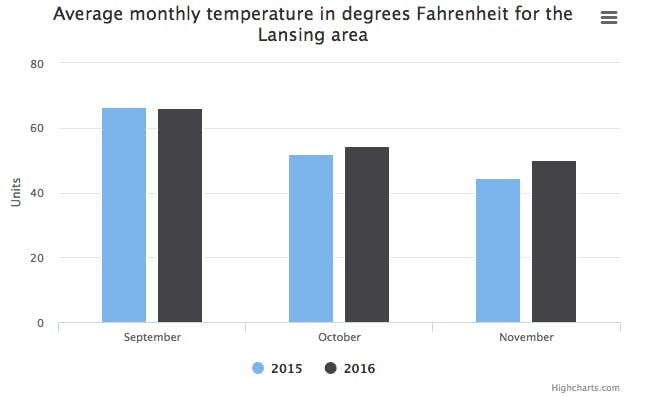Abnormally warm temperatures have extended into mid-November. While it’s easy to blame global warming, National Weather Service meteorologist Wayne Hoepner said there are other factors at play.
Hoepner said both September and October were 4 degrees above average temperature and November has been 7 degrees above average so far, though it is expected to cool down.
“Yes, we have been warmer than normal and part of it was the El Niño, La Niña cycle,” he said. “Another part was a high pressure system, mostly stacked up above the center U.S., and it causes things to circle up through Canada. (It) keeps the cold air locked up further north.”
According to the National Oceanic and Atmospheric Administration, El Niño and La Niña cycles are weather cycles characterized by unusually warmer and cooler temperatures in the Equatorial Pacific Ocean, respectively.
| 2015 | 2016 | |
|---|---|---|
| September | 66.5 | 66.0 |
| October | 51.9 | 54.3 |
| November | 44.5 | 50.0 |
Nathan Moore, an associate professor in the Department of Geography, Environment and Spatial Sciences, said the weather in the past several days is significantly above average.
“We’re significantly above (average),” Moore said. “Eight to 10 degrees is a significantly big jump and to be having an 8 to 10 degree highwater mark for several days in a row is exceptional.”
Still, Moore said not to attribute warm weather in November to climate change.
He said climate change is generally studied through a 30-year period, so one year’s warm fall is not necessarily indicative of rising global temperatures.
“Climate is what you expect, weather is what you get,” he said. “To say that this is driven by climate change, well, that’s not really possible to say. You could say it’s very statistically unlikely, but weather does vary quite a lot. If you were to have this for a number of successive fall time periods for year after year after year, then you could attribute to some sort of broader atmospheric forcing.”
Despite abnormal warmth, Hoepner said not to worry, temperatures are expected to fall soon.
An especially warm fall is likely to be followed by an exceptionally cold winter, Hoepner said.
“It’s not good or bad,” he said. “It’s just part of the weather. Through the winter, I know we’re expecting it to be colder than normal and probably a little snowier than normal because (of) all the models they’ve been looking at.”
For now, Moore emphasized waiting for more data to come out before jumping to conclusions.
Moore said because one season is not the defining factor in climate change, there is no cause for concern yet.
“I think you should enjoy the warm weather,” Moore said.







